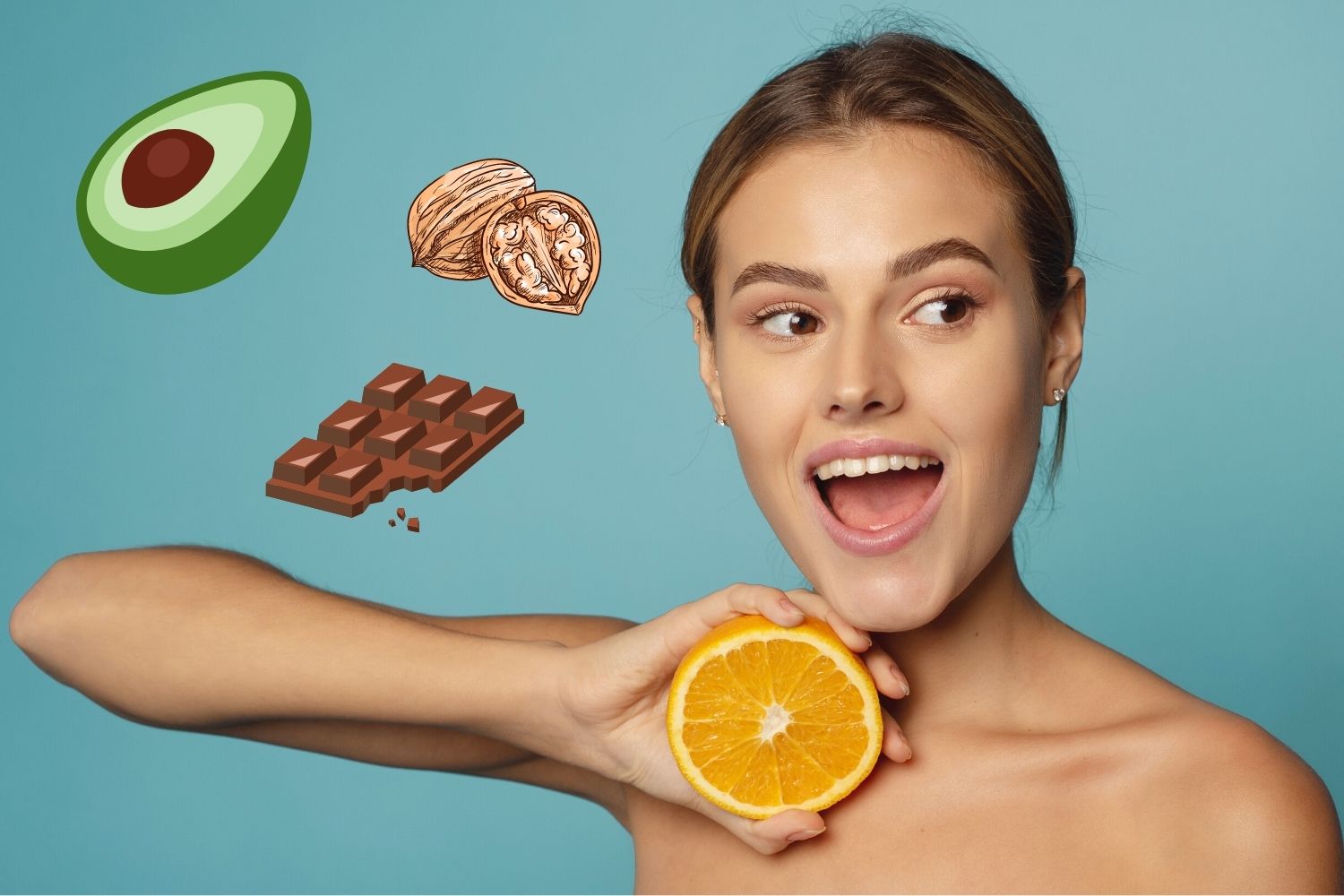We’ve all heard that phrase “you are what you eat” right? Well that statement reigns especially true when it comes to the correlation between your diet and skin health. Unhealthy food choices like greasy fast food, alcohol or even too much coffee, can lead to breakouts and premature skin aging. As more research is conducted, there is an obvious correlation between what you put in your body and how your skin looks. The following are five foods you should incorporate in your diet for healthy, clear, glowing skin.
1. Fish: The fatty fish like salmon, are rich in fatty acids that help reinforce your skin’s barrier and lock in moisture. The Omega-3 fatty acids also help reduce skin inflammation and can work to strengthen your skin’s barrier against free radicals like UV rays. Fatty fish are also a good source of vitamin E which delivers your skin with necessary antioxidants. This encourages the production of new skin cells while protecting and strengthening your skin from further damage.
2. Nuts: More specifically, walnuts. Walnuts are rich in essential fatty acids and tend to be the most nutrient rich out of all nuts. They contain omega-3 and omega-6 fatty acids to help soothe skin inflammation. They also encourage collagen production while improving skin elasticity to reveal new, healthy skin cells and combat fine lines & wrinkles.
3. Avocados: This may be an obvious one since there are so many skin care ingredients that incorporate some type of avocado or avocado oil. The reason for avocados popularity when it comes to skin is the fact that it contains vitamins A, D and E along with healthy fats. The healthy fats found in avocados work to keep your skin flexible, supple and moisturized. Some studies also found that avocados contain a compound that can help protect your skin from UV ray damage, thus minimizing fine lines and wrinkles. The vitamin E found in avocado is a vital antioxidant that also helps protect your skin barrier from free radical damage. While vitamin C strengthens your skin’s protection against the sun and can even help even your complexion.
4. Broccoli. We are constantly told to eat our daily dose of veggies but when it comes to skin, broccoli is the ultimate veggie. Broccoli contains so many vitamins and minerals that contribute to skin health like zinc, vitamin A and vitamin C. Broccoli is also rich in lutein, which helps protect skin from oxidative damage and encourages long-lasting hydration. One thing that makes broccoli especially good for your skin is that it contains the compound sulforaphane. This compound works as a protective agent against sun damage and neutralizes other free radicals like air pollution.
5. Dark chocolate. Yes, you read that right, chocolate can actually be good for you! If you’re looking for a reason to treat yourself to some dark chocolate, here it is. The effects of cocoa on the skin has been shown to strengthen and hydrate. One study found that within 6-12 weeks of consuming cocoa powder, the participants’ skin was thicker and more hydrated than before. While another study found that eating a high-antioxidant chocolate everyday could help your skin withstand more UV rays and prevent damage. Some studies have also demonstrated anti-aging benefits in association to digesting dark chocolate daily. However, although the cocao found in chocolate is good for you, the high sugar content is not. So, try looking for a chocolate with a high cocoa concentrate and lower sugar.
SOURCES:
Pilkington S.M., Rhodes L.E. (2010) Omega-3 Fatty Acids and Skin. In: Krutmann J., Humbert (eds) Nutrition for Healthy Skin. Springer, Berlin, Heidelberg. https://doi.org/10.1007/978-3-642-12264-4_9
De Mel, D., & Suphioglu, C. (2014). Fishy business: effect of omega-3 fatty acids on zinc transporters and free zinc availability in human neuronal cells. Nutrients, 6(8), 3245–3258. https://doi.org/10.3390/nu6083245
Lorencini, M., Brohem, C. A., Dieamant, G. C., Zanchin, N. I., & Maibach, H. I. (2014). Active ingredients against human epidermal aging. Ageing research reviews, 15, 100–115. https://doi.org/10.1016/j.arr.2014.03.002
Nagata, C., Nakamura, K., Wada, K., Oba, S., Hayashi, M., Takeda, N., & Yasuda, K. (2010). Association of dietary fat, vegetables and antioxidant micronutrients with skin ageing in Japanese women. The British journal of nutrition, 103(10), 1493–1498. https://doi.org/10.1017/S0007114509993461
Telang P. S. (2013). Vitamin C in dermatology. Indian dermatology online journal, 4(2), 143–https://doi.org/10.4103/2229-5178.110593
Lamore, S. D., & Wondrak, G. T. (2011). Zinc pyrithione impairs zinc homeostasis and upregulates stress response gene expression in reconstructed human epidermis. Biometals : an international journal on the role of metal ions in biology, biochemistry, and medicine, 24(5), 875–890. https://doi.org/10.1007/s10534-011-9441-6
Sikdar, S., Papadopoulou, M., & Dubois, J. (2016). What do we know about sulforaphane protection against photoaging?. Journal of cosmetic dermatology, 15(1), 72–77. https://doi.org/10.1111/jocd.12176
Kleszczyński, K., Ernst, I. M., Wagner, A. E., Kruse, N., Zillikens, D., Rimbach, G., & Fischer, W. (2013). Sulforaphane and phenylethyl isothiocyanate protect human skin against UVR-induced oxidative stress and apoptosis: role of Nrf2-dependent gene expression and antioxidant enzymes. Pharmacological research, 78, 28–40. https://doi.org/10.1016/j.phrs.2013.09.009
Heinrich, U., Neukam, K., Tronnier, H., Sies, H., & Stahl, W. (2006). Long-term ingestion of high flavanol cocoa provides photoprotection against UV-induced erythema and improves skin condition in women. The Journal of nutrition, 136(6), 1565–1569. https://doi.org/10.1093/jn/136.6.1565
Scapagnini, G., Davinelli, S., Di Renzo, L., De Lorenzo, A., Olarte, H. H., Micali, G., Cicero, A. F., & Gonzalez, S. (2014). Cocoa bioactive compounds: significance and potential for the maintenance of skin health. Nutrients, 6(8), 3202–3213. https://doi.org/10.3390/nu6083202


No responses yet